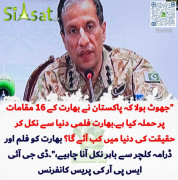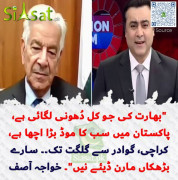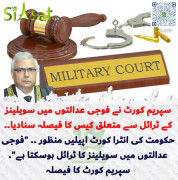Night_Hawk
Siasat.pk - Blogger
6 October 2010 Last updated at 11:25 ET Blow to US prosecutors as terror case witness barred

Ahmed Khalfan Ghailani, a native of Tan****a, was arrested in 2004
The judge in the first civilian trial of a former Guantanamo inmate has ruled that a key US government witness cannot testify, in a blow to prosecutors.
Defendant Ahmed Khalfan Ghailani denies helping al-Qaeda kill 224 people in the 1998 US embassy bombings in Africa.
The judge ruled that the man officials say sold Mr Ghailani explosives could not testify as he had been identified through harsh interrogation techniques.
The trial in New York was postponed until 12 October.
It was due to start on Wednesday.
The BBC's Laura Trevelyan in New York says the judge's decision is a major setback to the case against Mr Ghailani, and complicates the Obama administration's policy of trying Guantanamo detainees in civilian courts.
The proposed witness, Hussein Abebe, was expected to testify that he had sold the TNT to Ghailaini used in the bombing of the US embassy Tan****a in August 1998.
A US prosecutor had described Mr Abebe as a "giant" witness for the government, which is considering whether to appeal against the ruling.
Mr Abebe was identified by Mr Ghailani while he was undergoing what his lawyers say were harsh interrogation techniques at a secret CIA camp.
The defence had argued that Mr Abebe should not be called as a witness.
Our correspondent adds that this presents prosecutors with an ongoing problem: If evidence obtained in CIA prisons or at Guantanamo is inadmissible in civilian courts, is it possible to get convictions?
Mr Ghailani was held in Pakistan in 2004 and taken to Guantanamo in 2006. His lawyers say he was tortured.
The case is seen as a test of the Obama administration's pledge to close the US military base in Cuba by next January.
Whereas other detainees have been tried by military commissions, Mr Ghailani is the first Guantanamo prisoner to be tried in the civilian courts.

Ahmed Khalfan Ghailani, a native of Tan****a, was arrested in 2004
The judge in the first civilian trial of a former Guantanamo inmate has ruled that a key US government witness cannot testify, in a blow to prosecutors.
Defendant Ahmed Khalfan Ghailani denies helping al-Qaeda kill 224 people in the 1998 US embassy bombings in Africa.
The judge ruled that the man officials say sold Mr Ghailani explosives could not testify as he had been identified through harsh interrogation techniques.
The trial in New York was postponed until 12 October.
It was due to start on Wednesday.
The BBC's Laura Trevelyan in New York says the judge's decision is a major setback to the case against Mr Ghailani, and complicates the Obama administration's policy of trying Guantanamo detainees in civilian courts.
The proposed witness, Hussein Abebe, was expected to testify that he had sold the TNT to Ghailaini used in the bombing of the US embassy Tan****a in August 1998.
A US prosecutor had described Mr Abebe as a "giant" witness for the government, which is considering whether to appeal against the ruling.
Mr Abebe was identified by Mr Ghailani while he was undergoing what his lawyers say were harsh interrogation techniques at a secret CIA camp.
The defence had argued that Mr Abebe should not be called as a witness.
Our correspondent adds that this presents prosecutors with an ongoing problem: If evidence obtained in CIA prisons or at Guantanamo is inadmissible in civilian courts, is it possible to get convictions?
Mr Ghailani was held in Pakistan in 2004 and taken to Guantanamo in 2006. His lawyers say he was tortured.
The case is seen as a test of the Obama administration's pledge to close the US military base in Cuba by next January.
Whereas other detainees have been tried by military commissions, Mr Ghailani is the first Guantanamo prisoner to be tried in the civilian courts.

































